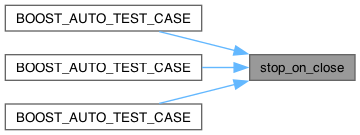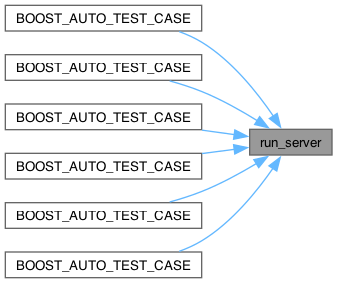#include <boost/test/unit_test.hpp>#include <websocketpp/common/thread.hpp>#include <websocketpp/config/core.hpp>#include <websocketpp/config/core_client.hpp>#include <websocketpp/config/asio.hpp>#include <websocketpp/config/asio_client.hpp>#include <websocketpp/config/debug_asio.hpp>#include <websocketpp/server.hpp>#include <websocketpp/client.hpp>
Go to the source code of this file.
Classes | |
| struct | config |
| struct | config::transport_config |
| struct | config_tls |
| struct | config_tls::transport_config |
Macros | |
| #define | BOOST_TEST_MODULE transport_integration |
Typedefs | |
| typedef websocketpp::server< config > | server |
| typedef websocketpp::client< config > | client |
| typedef websocketpp::server< config_tls > | server_tls |
| typedef websocketpp::client< config_tls > | client_tls |
| typedef websocketpp::server< websocketpp::config::core > | iostream_server |
| typedef websocketpp::client< websocketpp::config::core_client > | iostream_client |
Functions | |
| template<typename T > | |
| void | close_after_timeout (T &e, websocketpp::connection_hdl hdl, long timeout) |
| void | run_server (server *s, int port, bool log=false) |
| void | run_client (client &c, std::string uri, bool log=false) |
| void | run_client_and_mark (client *c, bool *flag, websocketpp::lib::mutex *mutex) |
| void | run_time_limited_client (client &c, std::string uri, long timeout, bool log) |
| void | run_dummy_server (int port) |
| void | run_dummy_client (std::string port) |
| bool | on_ping (server *s, websocketpp::connection_hdl, std::string) |
| void | cancel_on_open (server *s, websocketpp::connection_hdl) |
| void | stop_on_close (server *s, websocketpp::connection_hdl hdl) |
| template<typename T > | |
| void | ping_on_open (T *c, std::string payload, websocketpp::connection_hdl hdl) |
| void | fail_on_pong (websocketpp::connection_hdl, std::string) |
| void | fail_on_pong_timeout (websocketpp::connection_hdl, std::string) |
| void | req_pong (std::string expected_payload, websocketpp::connection_hdl, std::string payload) |
| void | fail_on_open (websocketpp::connection_hdl) |
| void | delay (websocketpp::connection_hdl, long duration) |
| template<typename T > | |
| void | check_ec (T *c, websocketpp::lib::error_code ec, websocketpp::connection_hdl hdl) |
| template<typename T > | |
| void | check_ec_and_stop (T *e, websocketpp::lib::error_code ec, websocketpp::connection_hdl hdl) |
| template<typename T > | |
| void | req_pong_timeout (T *c, std::string expected_payload, websocketpp::connection_hdl hdl, std::string payload) |
| template<typename T > | |
| void | close (T *e, websocketpp::connection_hdl hdl) |
| void | run_test_timer (long value) |
| BOOST_AUTO_TEST_CASE (pong_no_timeout) | |
| BOOST_AUTO_TEST_CASE (pong_timeout) | |
| BOOST_AUTO_TEST_CASE (client_open_handshake_timeout) | |
| BOOST_AUTO_TEST_CASE (server_open_handshake_timeout) | |
| BOOST_AUTO_TEST_CASE (client_self_initiated_close_handshake_timeout) | |
| BOOST_AUTO_TEST_CASE (client_peer_initiated_close_handshake_timeout) | |
| BOOST_AUTO_TEST_CASE (server_self_initiated_close_handshake_timeout) | |
| BOOST_AUTO_TEST_CASE (client_runs_out_of_work) | |
| BOOST_AUTO_TEST_CASE (client_is_perpetual) | |
| BOOST_AUTO_TEST_CASE (client_failed_connection) | |
| BOOST_AUTO_TEST_CASE (stop_listening) | |
| BOOST_AUTO_TEST_CASE (pause_reading) | |
| BOOST_AUTO_TEST_CASE (server_connection_cleanup) | |
Macro Definition Documentation
◆ BOOST_TEST_MODULE
| #define BOOST_TEST_MODULE transport_integration |
Definition at line 28 of file integration.cpp.
Typedef Documentation
◆ client
| typedef websocketpp::client<config> client |
Definition at line 126 of file integration.cpp.
◆ client_tls
| typedef websocketpp::client<config_tls> client_tls |
Definition at line 129 of file integration.cpp.
◆ iostream_client
Definition at line 132 of file integration.cpp.
◆ iostream_server
Definition at line 131 of file integration.cpp.
◆ server
| typedef websocketpp::server<config> server |
Definition at line 125 of file integration.cpp.
◆ server_tls
| typedef websocketpp::server<config_tls> server_tls |
Definition at line 128 of file integration.cpp.
Function Documentation
◆ BOOST_AUTO_TEST_CASE() [1/13]
| BOOST_AUTO_TEST_CASE | ( | client_failed_connection | ) |
Definition at line 552 of file integration.cpp.
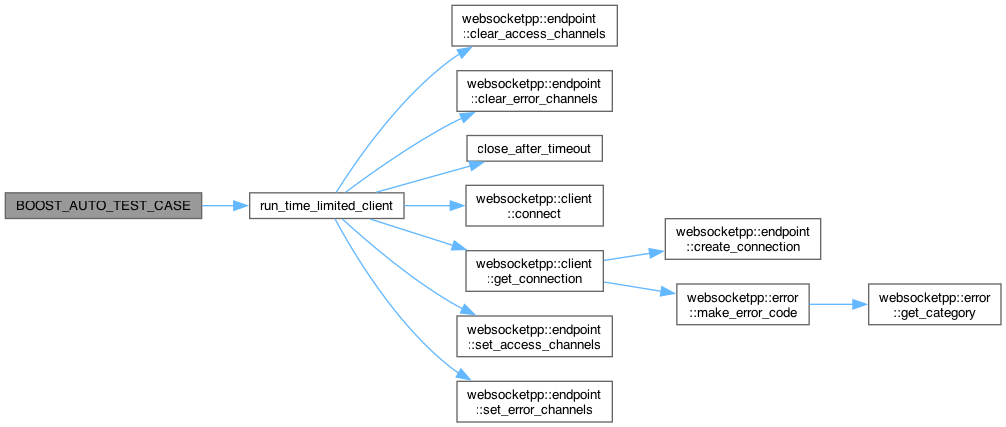
◆ BOOST_AUTO_TEST_CASE() [2/13]
| BOOST_AUTO_TEST_CASE | ( | client_is_perpetual | ) |
Definition at line 518 of file integration.cpp.

◆ BOOST_AUTO_TEST_CASE() [3/13]
| BOOST_AUTO_TEST_CASE | ( | client_open_handshake_timeout | ) |
Definition at line 409 of file integration.cpp.
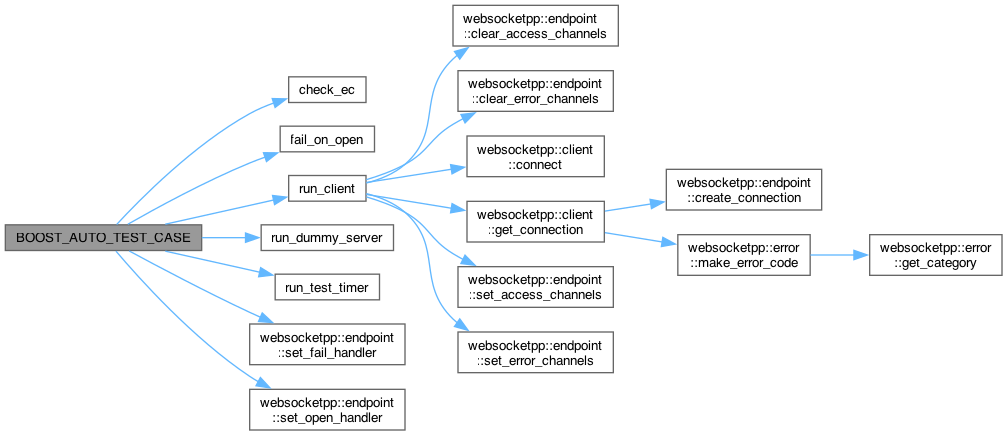
◆ BOOST_AUTO_TEST_CASE() [4/13]
| BOOST_AUTO_TEST_CASE | ( | client_peer_initiated_close_handshake_timeout | ) |
Definition at line 467 of file integration.cpp.
◆ BOOST_AUTO_TEST_CASE() [5/13]
| BOOST_AUTO_TEST_CASE | ( | client_runs_out_of_work | ) |
Definition at line 499 of file integration.cpp.

◆ BOOST_AUTO_TEST_CASE() [6/13]
| BOOST_AUTO_TEST_CASE | ( | client_self_initiated_close_handshake_timeout | ) |
Definition at line 444 of file integration.cpp.
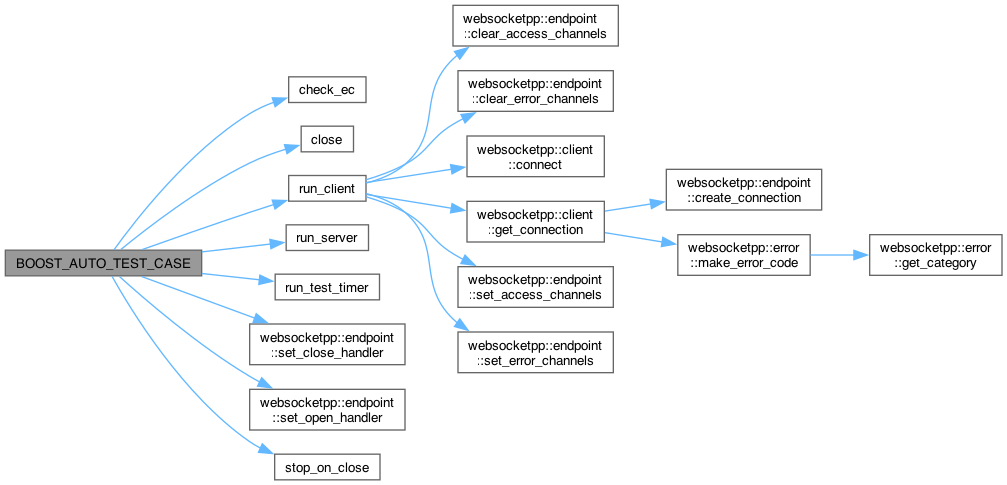
◆ BOOST_AUTO_TEST_CASE() [7/13]
| BOOST_AUTO_TEST_CASE | ( | pause_reading | ) |
Definition at line 577 of file integration.cpp.

◆ BOOST_AUTO_TEST_CASE() [8/13]
| BOOST_AUTO_TEST_CASE | ( | pong_no_timeout | ) |
Definition at line 363 of file integration.cpp.
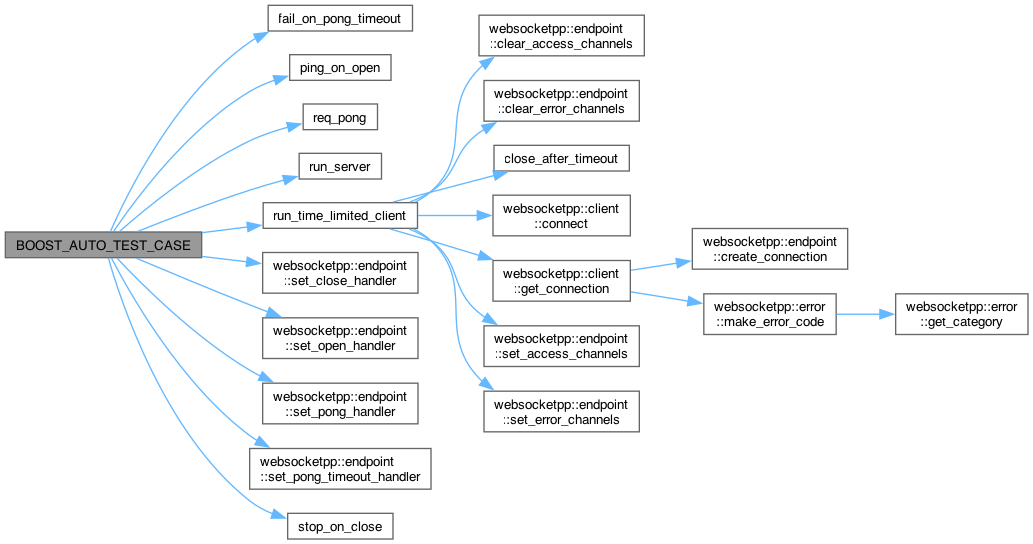
◆ BOOST_AUTO_TEST_CASE() [9/13]
| BOOST_AUTO_TEST_CASE | ( | pong_timeout | ) |
Definition at line 384 of file integration.cpp.
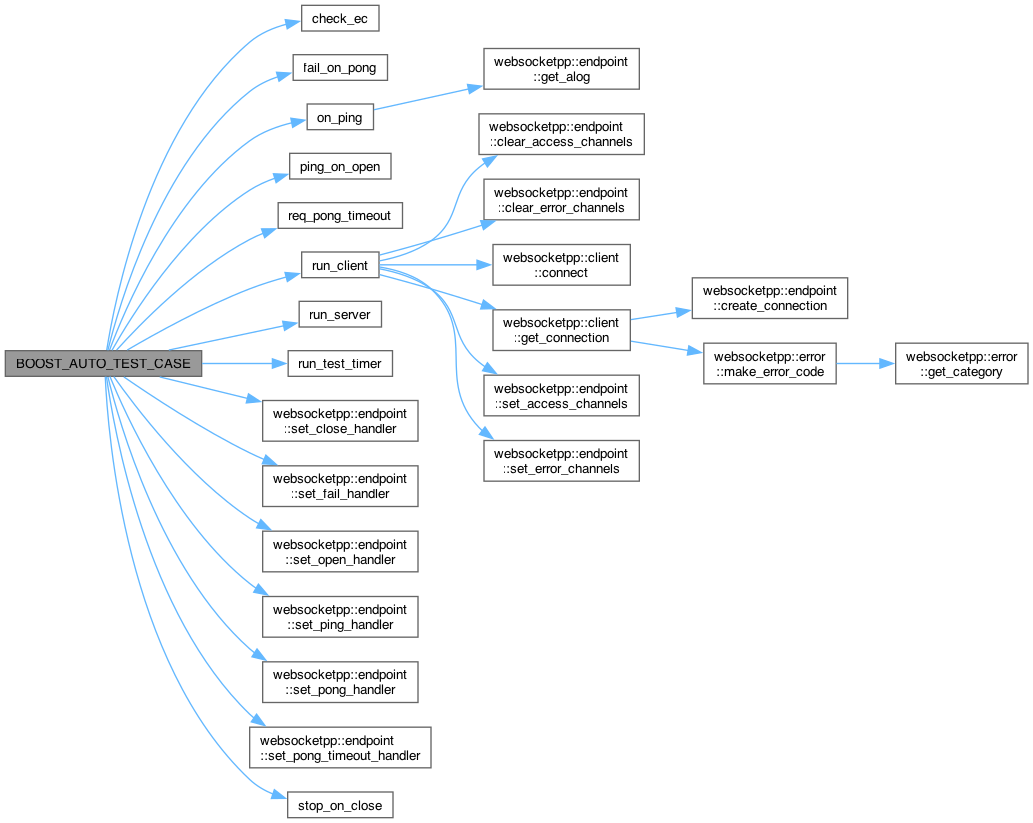
◆ BOOST_AUTO_TEST_CASE() [10/13]
| BOOST_AUTO_TEST_CASE | ( | server_connection_cleanup | ) |
Definition at line 607 of file integration.cpp.
◆ BOOST_AUTO_TEST_CASE() [11/13]
| BOOST_AUTO_TEST_CASE | ( | server_open_handshake_timeout | ) |
Definition at line 426 of file integration.cpp.
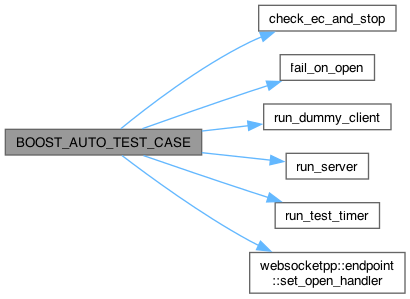
◆ BOOST_AUTO_TEST_CASE() [12/13]
| BOOST_AUTO_TEST_CASE | ( | server_self_initiated_close_handshake_timeout | ) |
Definition at line 476 of file integration.cpp.
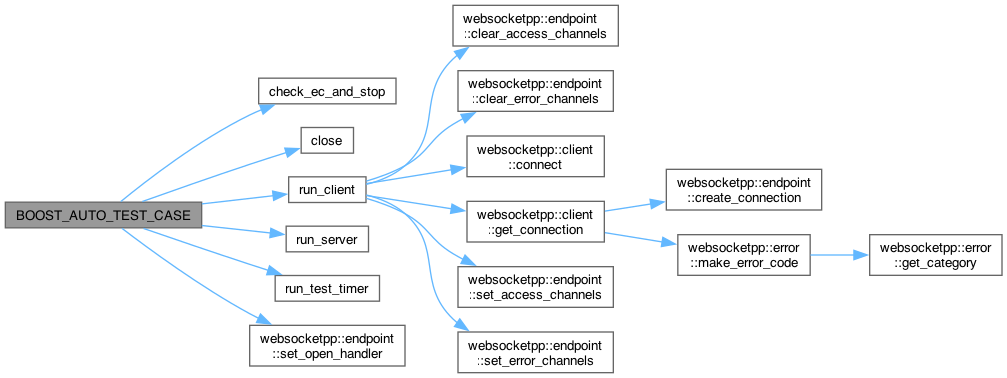
◆ BOOST_AUTO_TEST_CASE() [13/13]
| BOOST_AUTO_TEST_CASE | ( | stop_listening | ) |
Definition at line 558 of file integration.cpp.
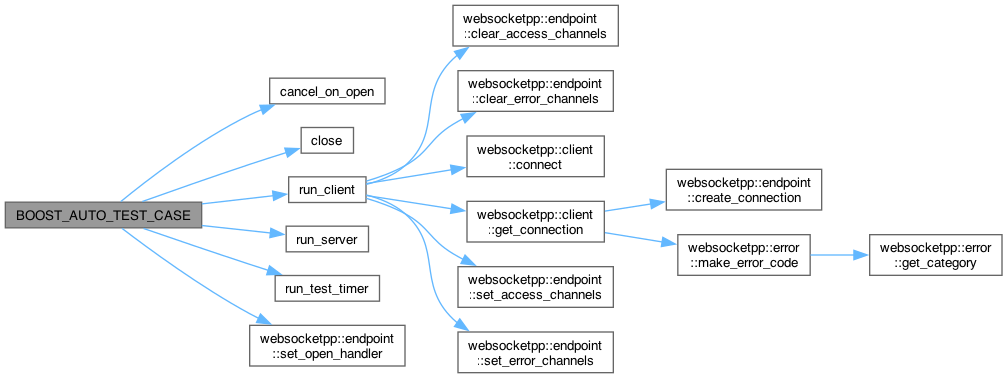
◆ cancel_on_open()
| void cancel_on_open | ( | server * | s, |
| websocketpp::connection_hdl | ) |
◆ check_ec()
| void check_ec | ( | T * | c, |
| websocketpp::lib::error_code | ec, | ||
| websocketpp::connection_hdl | hdl ) |
Definition at line 323 of file integration.cpp.
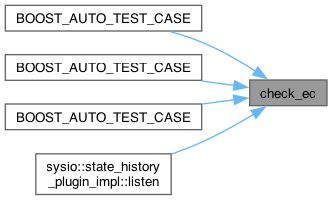
◆ check_ec_and_stop()
| void check_ec_and_stop | ( | T * | e, |
| websocketpp::lib::error_code | ec, | ||
| websocketpp::connection_hdl | hdl ) |
Definition at line 333 of file integration.cpp.

◆ close()
| void close | ( | T * | e, |
| websocketpp::connection_hdl | hdl ) |
Definition at line 353 of file integration.cpp.
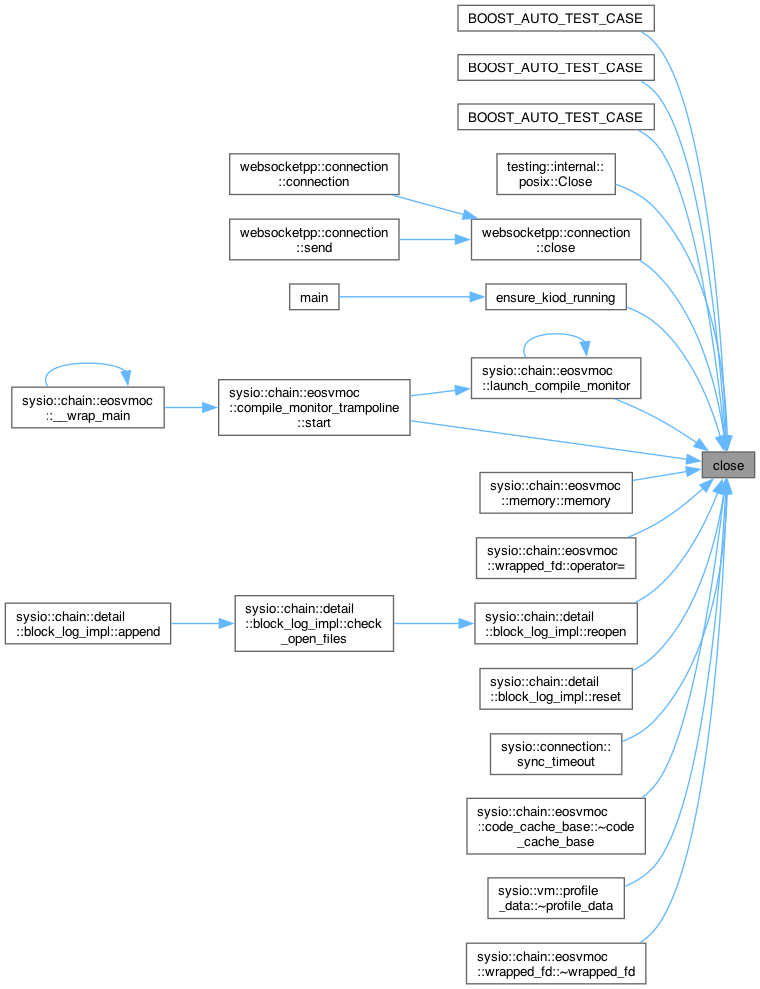
◆ close_after_timeout()
| void close_after_timeout | ( | T & | e, |
| websocketpp::connection_hdl | hdl, | ||
| long | timeout ) |
Definition at line 139 of file integration.cpp.

◆ delay()
| void delay | ( | websocketpp::connection_hdl | , |
| long | duration ) |
Definition at line 318 of file integration.cpp.

◆ fail_on_open()
| void fail_on_open | ( | websocketpp::connection_hdl | ) |
Definition at line 314 of file integration.cpp.

◆ fail_on_pong()
| void fail_on_pong | ( | websocketpp::connection_hdl | , |
| std::string | ) |
Definition at line 300 of file integration.cpp.

◆ fail_on_pong_timeout()
| void fail_on_pong_timeout | ( | websocketpp::connection_hdl | , |
| std::string | ) |
Definition at line 304 of file integration.cpp.

◆ on_ping()
| bool on_ping | ( | server * | s, |
| websocketpp::connection_hdl | , | ||
| std::string | ) |
Definition at line 276 of file integration.cpp.


◆ ping_on_open()
| void ping_on_open | ( | T * | c, |
| std::string | payload, | ||
| websocketpp::connection_hdl | hdl ) |
Definition at line 293 of file integration.cpp.

◆ req_pong()
| void req_pong | ( | std::string | expected_payload, |
| websocketpp::connection_hdl | , | ||
| std::string | payload ) |
Definition at line 308 of file integration.cpp.

◆ req_pong_timeout()
| void req_pong_timeout | ( | T * | c, |
| std::string | expected_payload, | ||
| websocketpp::connection_hdl | hdl, | ||
| std::string | payload ) |
Definition at line 344 of file integration.cpp.

◆ run_client()
| void run_client | ( | client & | c, |
| std::string | uri, | ||
| bool | log = false ) |
Definition at line 164 of file integration.cpp.
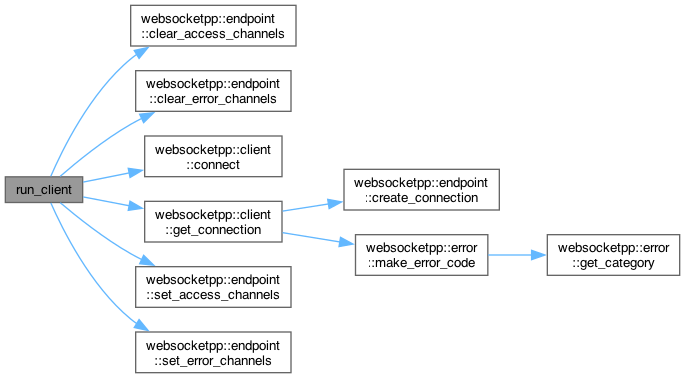
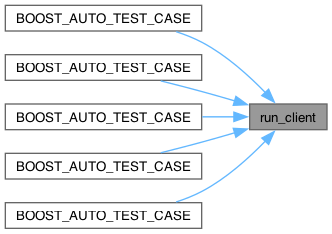
◆ run_client_and_mark()
| void run_client_and_mark | ( | client * | c, |
| bool * | flag, | ||
| websocketpp::lib::mutex * | mutex ) |
Definition at line 184 of file integration.cpp.


◆ run_dummy_client()
| void run_dummy_client | ( | std::string | port | ) |
Definition at line 247 of file integration.cpp.

◆ run_dummy_server()
| void run_dummy_server | ( | int | port | ) |
Definition at line 220 of file integration.cpp.

◆ run_server()
| void run_server | ( | server * | s, |
| int | port, | ||
| bool | log = false ) |
◆ run_test_timer()
| void run_test_timer | ( | long | value | ) |
Definition at line 358 of file integration.cpp.
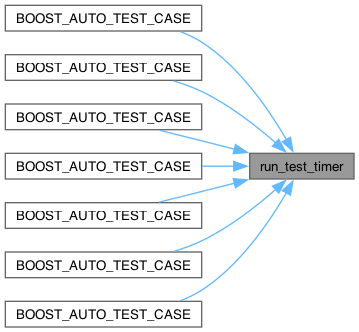
◆ run_time_limited_client()
| void run_time_limited_client | ( | client & | c, |
| std::string | uri, | ||
| long | timeout, | ||
| bool | log ) |
Definition at line 192 of file integration.cpp.
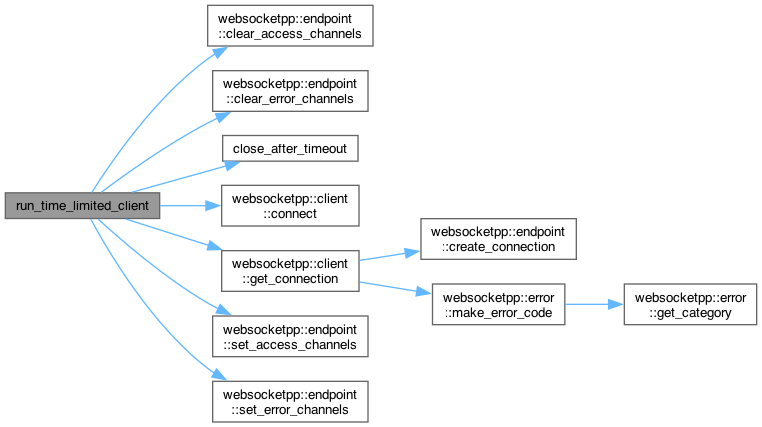

◆ stop_on_close()
| void stop_on_close | ( | server * | s, |
| websocketpp::connection_hdl | hdl ) |
Definition at line 285 of file integration.cpp.
